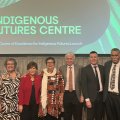Recovery from a traumatic car accident is difficult enough let alone finishing a landmark PhD on northern beef cattle production at the same time.
But for UQ PhD graduate Dr Darryl Savage, 30, a job offer as lecturer within the School of Rural Agriculture and Science at the University of New England motivated him to finish his doctorate despite a painful three months in hospital.
He will receive his degree at UQ Gatton’s graduation ceremony at 10am this Friday, December 17, with his wife Leanne and parents, Ann and Adrian, in the audience.
His car was hit head-on by a truck as he drove along the Cunningham Highway just before Christmas 2002 to visit Leanne, then his girlfriend, in Armidale.
Dr Savage’s doctorate has established new benchmarks for northern Australian beef production, and is the first study in this region linking nutrition, breeding rates and herd management to be completed since trials almost 40 years ago in 1965.
Funded by The North Australian Pastoral Company, Ridley Agriproducts, the Northern Territory Government, and Meat and Livestock Australia, Dr Savage spent five years examining four herds of cattle at the world’s second-biggest cattle station, the 4.4-million-acre Alexandria Station, 350kms from Tennant Creek in the Northern Territory.
His daily studies involved weighing and pregnancy testing more than 10,000 cows, measuring pasture and dung quality every month, and continually recording the rainfall in four paddocks.
Dr Savage found that with appropriate nutritional management, pregnancy rates in northern Australia can match those of the more favourable southern regions of New South Wales and Victoria.
“I also found that management practices such as breeding cows at age 15 months instead of two years produced an extra calf in each cow’s lifetime with chances of re-conception rates the next year of around 90 percent,” Dr Savage said.
Northern Australia is home to around 57 percent of Australia’s total beef cattle industry or 14 million head of cattle.
Dr Savage’s findings are already being implemented by the industry.
Already a Bachelor of Applied Science (Rural Technology) with honours from UQ Gatton (1995) when he started his PhD, Dr Savage said he was relieved to have finally finished his doctorate.
“I am especially grateful to UQ St Lucia and UQ Gatton library staff as well as staff at the Arid Zone Research Institute in Alice Springs for their support during my studies,” he said.
Following the car accident, Dr Savage was airlifted to the Princess Alexandra Hospital then transferred to the Mater Private at Redlands, enduring severe pain and three major operations mainly to his right knee and leg.
He can no longer play his beloved Rugby Union but said he might return to the game in some capacity in the near future.
Dr Savage was formerly the Northern Territory representative for the Young People in Rural Industries Working Group and the North Australian Nutrition Steering Committee, as well as a committee member of the North Australian Rural Careers Network, which develops initiatives to attract and retain more young people in rural industries.
He won the Regional Initiative category and was a national finalist in the Young Australian of the Year awards in 2001, received the Foundation for Young Australian Achiever Award and was also selected as one of 40 young Australians to attend the inaugural Young Rural Leaders Course in Canberra.
Media: Contact Dr Savage (phone: 0439 445 229, email: darryl.savage@une.edu.au) or Shirley Glaister at UQ Communications (phone: 07 3365 1120, email: s.glaister@uq.edu.au) or Brad Henderson, Marketing Coordinator, Faculty of NRAVS (phone: 0409 265 587)




